Movie Review – Purge, The: Anarchy
With a larger scale than the original, Anarchy reprises the odious Purge narrative that stretches the moral outrage well past breaking point. Any attempt at social examination is lost between the bullets and the screams, although I will say that if you enjoyed the first movie, this one will achieve similar results. The no-name cast stumble with the “acting”, but James DeMonaco’s direction is stylish, brisk and effective. Anarchy ain’t a classic, but it’s a worthwhile follow-up.
– Summary –
Director : James DeMonaco
Year Of Release : 2014
Principal Cast : Frank Grillo, Carmen Ejogo, Zach Gilford, Kiele Sanchez, Zoe Soul, Michael K Williams, Justina Machado, John Beasley, Jack Conley, Noel Gugliemi, Castullo Guerra, Edwin Hodge.
Approx Running Time : 103 Minutes
Synopsis: It’s Purge night again, and traditional friends and acquaintances suddenly become enemies as America cleanses itself through violence. A band of refugees from the carnage attempt to cross the city and escape death.
What we think : With a larger scale than the original, Anarchy reprises the odious Purge narrative that stretches the moral outrage well past breaking point. Any attempt at social examination is lost between the bullets and the screams, although I will say that if you enjoyed the first movie, this one will achieve similar results. The no-name cast stumble with the “acting”, but James DeMonaco’s direction is stylish, brisk and effective. Anarchy ain’t a classic, but it’s a worthwhile follow-up.
********************
Perhaps we’re not far from this.
The breakdown of social order is a continual political and community threat – riots, looting and general disorder by the populace is usually, swiftly brought under control by the government of the day, be it through police or military actions. After all, the safety of the general population shouldn’t be brought into question by an unruly few, right? The Purge: Anarchy, the sequel to the 2013 thriller The Purge, a film I thought was pretty average (at best), seeks to widen the scope of the low-budget original by parlaying a small cabal of refugees from America’s favorite violent evening into the urban landscape, where shadows loom larger, the terrain mostly unfamiliar, and the villains a lot more technologically advanced. As with the previous film, Anarchy seeks to purvey itself as an examination of a violent society run amok, to determine what makes people do the horrible things they do, although in keeping with the Purge franchise’s more salacious underpinnings, the subtext is lost beneath a layer of noise and fury. Admittedly, I did enjoy this one a little more than the original, mainly because the narrative attempts to deliver more story arcs than previously, but does this extra enjoyment make Anarchy a film you should make your way to watching? Are Anarchy’s anarchic overtones an investment in emotional entertainment, or is the violent excess too thinly plotted to overcome the flaws?
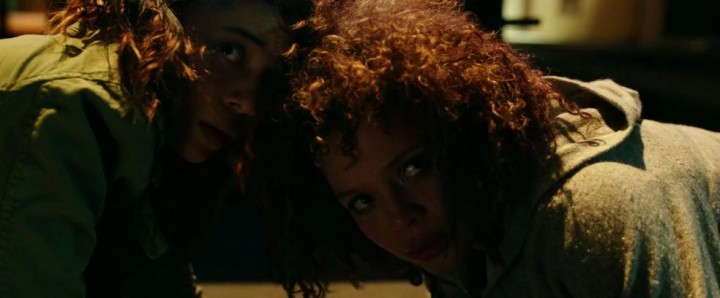
It’s Purge night across America – for 12 hours, all forms of crime are allowed through Government sanction, and emergency services will not attend any calls. In Los Angeles, waitress Eva Sanchez (Carmen Ejogo) arrives home to her father (John Beasley) and daughter Cali (Zoe Soul), to prepare to barricade themselves inside their apartment for the duration. Unbeknownst to the two women, Eva’s father, who is terminally ill, has purchased his daughters a future by offering himself up as a martyr to the Purge, paid for by rich citizens who seek a clean kill. Meanwhile, a young couple on the verge of breaking up – Shane (Zach Gilford) and Liz (Kiele Sanchez) – are stuck in downtown due to their car’s sudden mechanical failure. Also out on the town, Leo Barnes (Frank Grillo), who has a vendetta of his own during the evening’s purge. As he lucks upon Eva and Cali’s impending capture by what appears to be a militant force intent on rounding up the lower classes, Leo rescues them, and begins a cross-city chase to escape death by the various Purgers out for a kill. In the background, meanwhile, waits an underground rebellion against the Purge, led by Carmelo (Michael K Williams), who are fighting back against the chaos this orchestrated night of death brings.
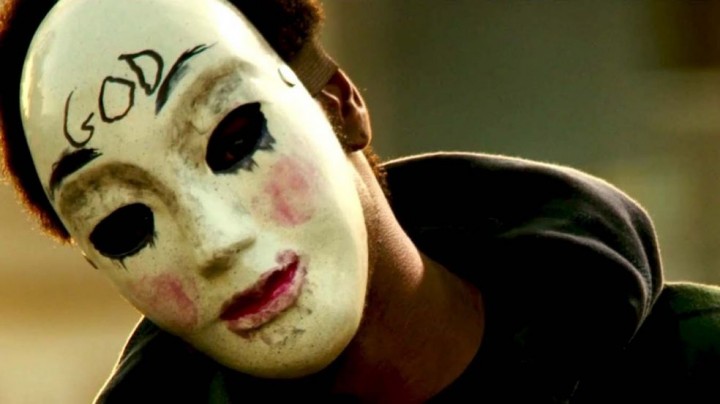
The Purge: Anarchy tops itself out at a little over 90 minutes of unrelenting mediocrity that only ends in, what else, really, but a hail of gunfire. Tedious in tone, obligatory cannon-fodder simply won’t die (until the very end), and the square-jawed hero manages to remain a square-jawed hero right to the bitter close; Anarchy is only anarchic by the premise it presents moreso than anything the story might cough up. As addled as I am watching this movie, for anything resembling a deconstruction of society over violence as a way of sating our communal blood-lust, I might as well have stabbed my eyeballs out with white-hot pokers and defenestrated myself from the second floor. As a genre film, and as a sequel to 2013’s The Purge, Anarchy delivers more of the same, only with lots more bodies, a load more ancillary characters, and far fewer plot twists than what you’ve seen before. If you’re expecting more, you obviously haven’t seen many Hollywood sequels before.
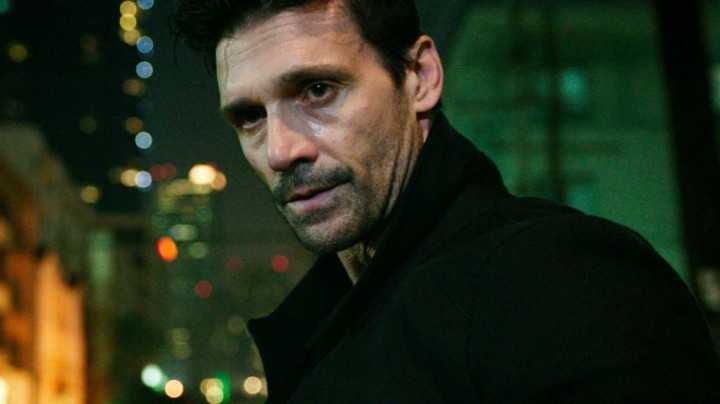
Anarchy is helmed by James DeMonaco, who pulled similar duty the first time, and as well as pointing the camera and yelling “action”, he’s also gone and written this thing too. Talk about multi-talented! From a creative standpoint, this actually aides the franchise in that it maintains consistency – the film could have gone anywhere after the first film, but DeMonarco seems intent on building a franchise here, with a potted history and sense of destiny about it all that, if I’m honest, is better than if they’d just regurgitated the original film with different people. I mean, that’s what they’ve done here, but DeMonarco is canny enough to at least try and mix things up a little, to expand the worldview of the Purge and to give us a glimpse into the lives of real people caught up in this madness. So I guess as a creative work, Anarchy is on par with the first film’s sense of crude violence and intangible family bonding, even if it’s inherently more sociopathic and infinitely more salacious.
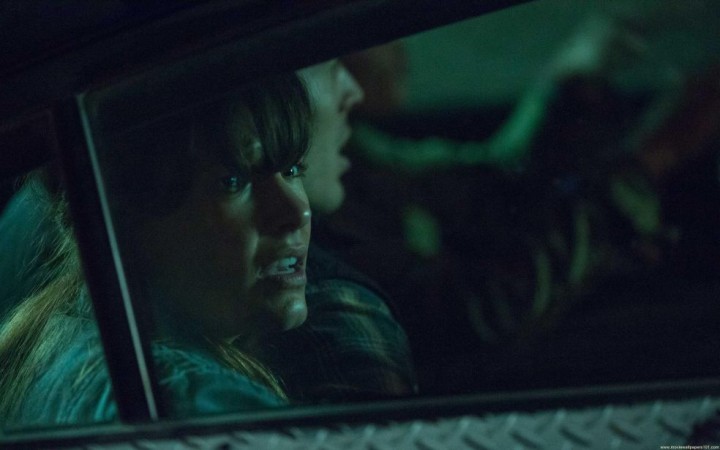
That doesn’t mean it’s any good – with the initial calm before the storm out the way, setting up this grab-bag of characters with back-story so limited I almost traveled back in time trying to work them out, Anarchy quickly essays the franchise’s mantra de jour: run, scream, fight, scream, die and run some more, all in a variety of that order. Ostensibly linked by hamfisted idealism (“I have a friend who lives eight blocks away who will lend us a car”…. as if!) and plot points so contrived they border on juvenile, Anarchy’s mechanism for maintaining audience interest becomes less about what or who these characters are, but simply whether they’ll survive whatever shitstorm comes their way via motorcycle, semi-trailer, or gleaming white van. Smeared in the vacuous promise of come-uppance and drip-fed the ecstasy of a no-win scenario, Anarchy’s redolent abuse depiction devalues the underlying story of people purging their violent tendencies, instead replacing it with a more traditional “us versus them” styled Big Brother riff. You get the sense that DeMonarco is laying the groundwork for a sequel to come, rather than focusing on this film entirely, although lip-service is payed to Frank Grillo’s Leo Barnes, whose vendetta against somebody who hurt him in the past pays off in the movie’s key final sequence (a sequence, I might add, that drags the film on for far too long, and with that “gosh shucks” type of ending that makes sequels so much less than their originals) so in many respects, this feels like a film trying to achieve so much more than it was capable of.
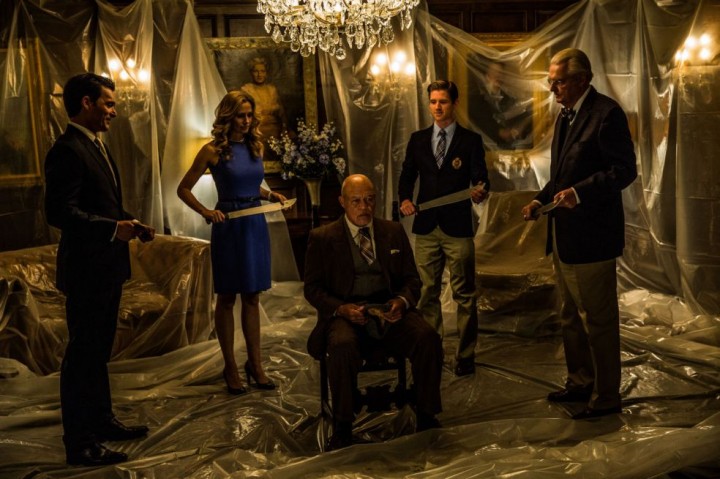
The cast, led by Grillo (who is about the only name I recognize here without resorting to Mr Google), and aided by real life couple Zach Gilford (who appeared in Devil’s Due) and Kiele Sanchez (appearing in another sequel here after replacing Melissa George’s character in 30 Days Of Night: Dark Days), while Carmen Ejogo (a bit role in the Uma Thurman Avengers, as well as a pivotal part in Jodie Foster’s The Brave One, align with this in her credits), and Zoe Soul (never heard of her, and after this, would be surprised if I ever did again) round out the “lead” roles this film has in it. I guess the fact nobody with any box-office appeal wanting to appear in a sequel to a terrible Ethan Hawke movie could have spelled doom for the infant franchise, but no doubt DeMonarco took solace in the knowledge that this gave him more money to spend on things like effects and….. little else. The script is a hodgepodge of badly written genre join-the-dots examples, the film is bathed in extensive darkness and shadow for much of its running time (the Purge occurs at night, because that’s when things are scary), and at times it’s hard to make out exactly what’s going on; although I will admit, my favorite scene for unintended belly laughs is a riotous family gathering which descends into carnage when one sista takes umbrage at her husband’s infidelity with the otha sista – this made my head hurt just watching it all transpire, and had some deep voice intoned “this scene was filmed in front of a live studio audience” I’d have bust a gut laughing my ass off. I half expected Jerry Springer to pop out with his microphone and those stupid plastic studio chairs people always threw.
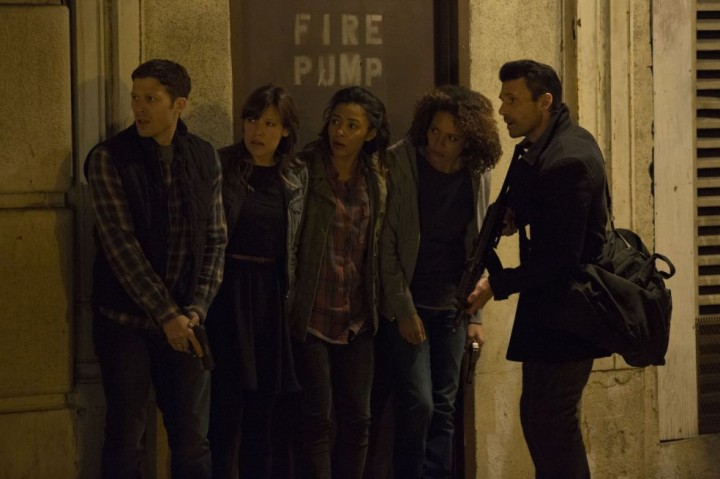
The Purge: Anarchy extends this franchise’s potential just enough to not send it scuttling into obscurity or irrelevance. Perhaps now, in light of the violence gripping the world at present, Anarchy’s message of violent, antisocial behavior has tapped into the cultural zeitgeist (I hope not!); whatever the case, Anarchy’s suma-bitch scripting and depressing, anti-establishment tone make for dour, unexciting viewing. Whatever message these films may have had is lost behind the curtain of carnage DeMonaco seems intent on throwing at us, and as an aside for a society on the verge of breakdown itself, perhaps it says more about what’s not being said than what is. Anarchy’s run-n-gun final half, its refusal to contain any subtext other than “bad people are bad, good people are good” and a willingness to forgo the creepy simplicity of the first film (in spite of its failure) ensure Anarchy’s more valiant effort is wasted in its conclusion. Sure, for fans of the original this film delivers more of the same, but for me, it didn’t do enough to differentiate itself, and that makes this sequel a weakquel.


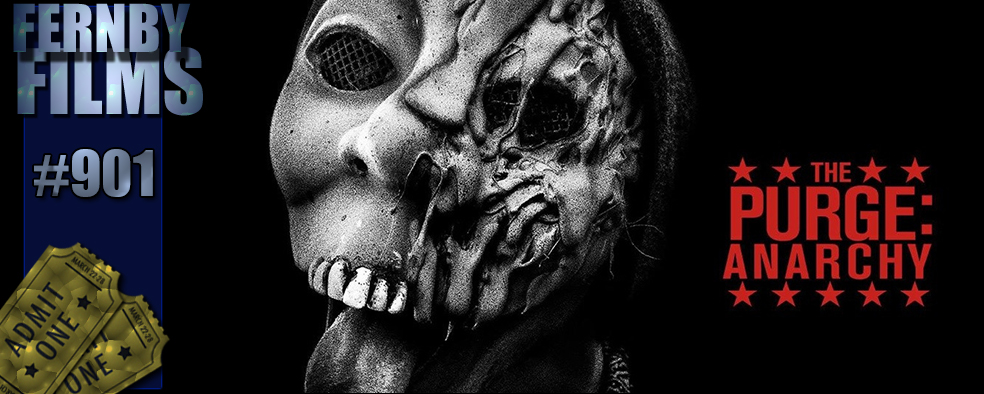

 Review – Grace of Monaco
Review – Grace of Monaco






Nice review – I'd probably give it the same rating. I thought The Purge was bloody awful, but this was a nice improvement and it passed the time.
Jack! Welcome back! Thought you'd fallen off the planet! That's about all this film did for me: pass the time. I could have watched something else, though. Twice bitten, now.
This is the film I wanted the first one to be. Now I feel as though they're behind a film, and this wasn't the second effort it should have been. On the other hand, if they continue to improve, the next one might be decent!
My recent post WTF: Insidious: Chapter 2 (2013)
One can only hope.
Home invasion films have been a bit hit and miss with me but I enjoyed the first film. I thought it was a good concept and its was stylishly brought together on screen. This is a sequel I'm hardly eager to see but I'm sure I'll check it out when it arrives on TV.
My recent post Growing Up with DiCaprio: His Life in 10 Films
Yeah, it's one you can wait for, for sure. I'm no fan of this franchise but it passed the time.